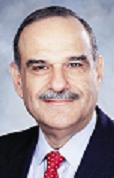Corruption watch, N.O. insurance dealings…
Gordon Russell of the T-P publicized a patronage system that is shameful at best. We can only hope for a steady and embarrassing drumbeat for correction as schemes like this come to light:
Over the past decade, various agencies of New Orleans city government have paid political operative Philip Baptiste hundreds of thousands of dollars for his advice on insurance matters.
What makes Baptiste's earnings remarkable is that they easily outstrip those of many full-time insurance agents. Not bad for a man known mainly for his political activism and his stewardship of a local housing and job-training nonprofit group. In fact, an observer might have a hard time figuring out that Baptiste, who in the 1960s became one of the first African-Americans in Louisiana to get an insurance license, is in the business at all these days.
Consider this: Baptiste's insurance brokerage is not listed in the phone book, nor is there a sign marking its physical location in Baptiste's Pontchartrain Park home. By his own estimation, he spends three or four hours per week on insurance, according to a recent court deposition.
How has Baptiste managed to do so well in the insurance business with so little effort? The answer is classic New Orleans: political connections and a Byzantine insurance-buying process designed with patronage in mind.
Instead of seeking competitive bids or hiring a professional risk manager for a flat fee, New Orleans installs political insiders on so-called insurance "committees," which are composed of up to 12 people who are at least nominally in the business.
Traditionally, one member of a committee buys policies for the city and splits the commissions with his peers. The amounts each member receives can range from about $10,000 to $60,000 per year, for a total that amounted to about $500,000 last year.
Traditionally, mayors have given committee seats to supporters, who return the favor by making campaign donations.
"It's insider dealing as only Louisiana can do it," said Paul Equale, a Washington, D.C., consultant and former head of the Independent Insurance Agents & Brokers of America, the country's largest brokers' association.
The system dates back decades, perhaps longer, and though once common in many cities, it has fallen out of favor in most.
Over the past decade, various agencies of New Orleans city government have paid political operative Philip Baptiste hundreds of thousands of dollars for his advice on insurance matters.
What makes Baptiste's earnings remarkable is that they easily outstrip those of many full-time insurance agents. Not bad for a man known mainly for his political activism and his stewardship of a local housing and job-training nonprofit group. In fact, an observer might have a hard time figuring out that Baptiste, who in the 1960s became one of the first African-Americans in Louisiana to get an insurance license, is in the business at all these days.
Consider this: Baptiste's insurance brokerage is not listed in the phone book, nor is there a sign marking its physical location in Baptiste's Pontchartrain Park home. By his own estimation, he spends three or four hours per week on insurance, according to a recent court deposition.
How has Baptiste managed to do so well in the insurance business with so little effort? The answer is classic New Orleans: political connections and a Byzantine insurance-buying process designed with patronage in mind.
Instead of seeking competitive bids or hiring a professional risk manager for a flat fee, New Orleans installs political insiders on so-called insurance "committees," which are composed of up to 12 people who are at least nominally in the business.
Traditionally, one member of a committee buys policies for the city and splits the commissions with his peers. The amounts each member receives can range from about $10,000 to $60,000 per year, for a total that amounted to about $500,000 last year.
Traditionally, mayors have given committee seats to supporters, who return the favor by making campaign donations.
"It's insider dealing as only Louisiana can do it," said Paul Equale, a Washington, D.C., consultant and former head of the Independent Insurance Agents & Brokers of America, the country's largest brokers' association.
The system dates back decades, perhaps longer, and though once common in many cities, it has fallen out of favor in most.





1 Comments:
This will require a lot of constant sunlight to disinfect.
Post a Comment
<< Home